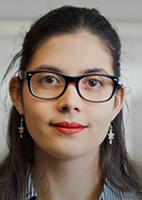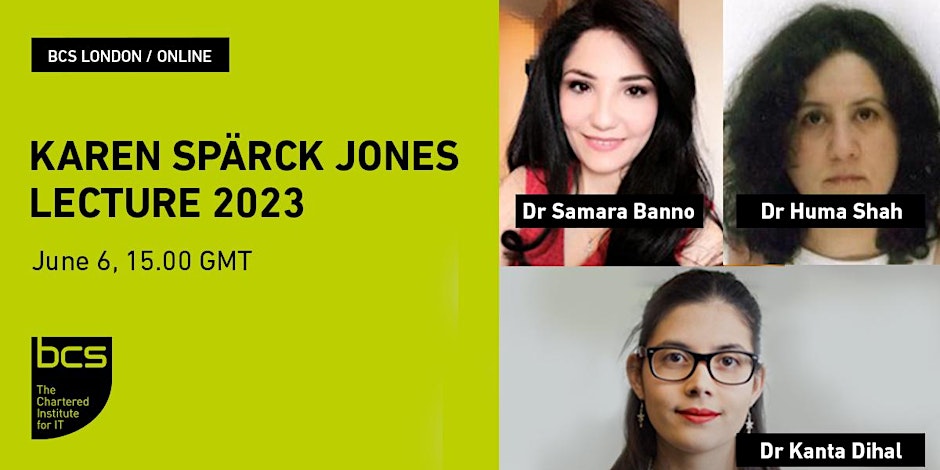This year’s Karen Spärck Jones lecture will be a hybrid event with 3 speakers who will talk about their research.
Speakers
- Dr Kanta Dihal, University of Cambridge
- Dr Huma Shah, Coventry University
- Dr Samara Banno, University of London
Agenda
3:00pm - Registration and networking
3:30pm - Lecture commences
4:30pm - Networking and refreshments
Synopsis
Dr Kanta Dihal: Kanta will share her work about the societal impact of artificial intelligence (AI) around the world. She will discuss the ways in which the benefits and drawbacks of AI are unequally distributed across the globe and how different parts of the world have reacted to AI advances. Kanta will demonstrate how people are pushing back and how science and politics makes use of AI fit their own purposes, and how countries are working with tech that is being created elsewhere and imposed externally.
Dr Huma Shah: We consistently hear about the importance of a diverse and inclusive technology industry – but how does this affect the outcomes of products and services that are created? Huma’s talk will focus on the importance of having diverse teams during the creation and testing of AI technology. She will outline the impact of diversity and inclusion within AI and share examples of how the work of non-diverse teams can cause issues in wider society.
Dr Samara Banno: Samara specialises in automated decision-making systems and her talk will showcase her study which uses artificial intelligence to help detect Alzheimer’s Disease. She will share how she evaluated the system, assessed the efficacy of the technology, and how it will be more widely applied.
Automated decision-making systems are tasked with making impactful judgements so they need to be created and used with care, so additionally, Samara will discuss the importance of the ethical and moral considerations when developing technology, and how transparency and accountability must be invested in.
About the speakers
 Kanta Dihal
Kanta Dihal
Dr Kanta Dihal is a Senior Research Fellow at the Leverhulme Centre for the Future of Intelligence, University of Cambridge. She leads two research projects, Global AI Narratives and Decolonizing AI, in which she explores intercultural public understanding of artificial intelligence as constructed by fictional and nonfictional narratives. Kanta’s work intersects the fields of science communication, literature and science, and science fiction. She has a PhD in science communication from the University of Oxford: in her thesis, ‘The Stories of Quantum Physics,’ she investigated the communication of conflicting interpretations of quantum physics to adults and children.
She is co-editor of the books AI Narratives: A History of Imaginative Thinking About Intelligent Machines (Oxford University Press, 2020) and Imagining AI: How the World Sees Intelligent Machines (Oxford University Press, 2022) and has co-authored a series of papers on AI narratives with Dr Stephen Cave, including ‘The Whiteness of AI’ (Philosophy and Technology, 2020). She is currently writing the book Stories in Superposition. For more of her publications, see the Publications page.
Kanta has advised the World Economic Forum, the UK House of Lords, and the United Nations on portrayals and perceptions of AI. She has been an invited speaker for national and international events, radio, and TV: for more information, see the Media & Press page.
 Huma Shah
Huma Shah
Dr. Huma Shah joined Coventry University in June 2014 from Reading University where she gained her PhD in ‘Deception-detection and machine intelligence in Practical Turing tests’. She worked on the EU FP7 funded ‘RoboLaw’ project. She is Director of Science (Co-Investigator) on a Coventry University-led, ten partner international consortium delivering the EU Horizon2020 research and innovation funded project (CSI-COP) concerned with online data-privacy. The CSI-COP project applies a citizen science approach to investigate tracking-by-default and GDPR compliance in website cookies and smart phone apps. CSI-COP has been shortlisted for the ‘Best Innovative Privacy Project’ category in the inaugural Privacy, InfoSec, Culture, Change, Awareness, Societal, Organisation.
(PICCASO) awards
More information on the EU Horizon2020 project
CSI-COP website
Related Experiences: Huma teaches technology/AI ethics to students from different courses in Coventry University.
 Samara Banno
Samara Banno
Samara Banno is a Daphne Jackson Fellow at Birkbeck, University of London in the Department of Psychological Science.
With a BSc and MSc from Al Nahrain University in Iraq, Samara’s background is in general information systems and her interest lies in developing intelligent cognitive computational and AI models. Having worked both as a lecturer and in industry, she completed her PhD at the University of Portsmouth/ School of Engineering.
Now returning to research after a four-year break Samara’s Fellowship is sponsored by Birkbeck, University of London and the Medical Research Council (MRC).
Due to finish in 2024, her project is entitled: Developing an Intelligent Diagnosis Model for Early Awareness of Brain Deterioration in Dementia.
Our events are for adults aged 16 years and over.
BCS is a membership organisation. If you enjoy this event, please consider joining BCS. You’ll be very welcome. You’ll receive access to many exclusive career development tools, an introduction to a thriving professional community and also help us Make IT Good For Society. Join BCS today
COVID-19
BCS is following government guidelines and we would ask attendees to continue to also follow these guidelines. Please go to https://www.nhs.uk/conditions/coronavirus-covid-19/ for more information, advice, and instructions.
This event is brought to you by: BCS Academy of Computing














